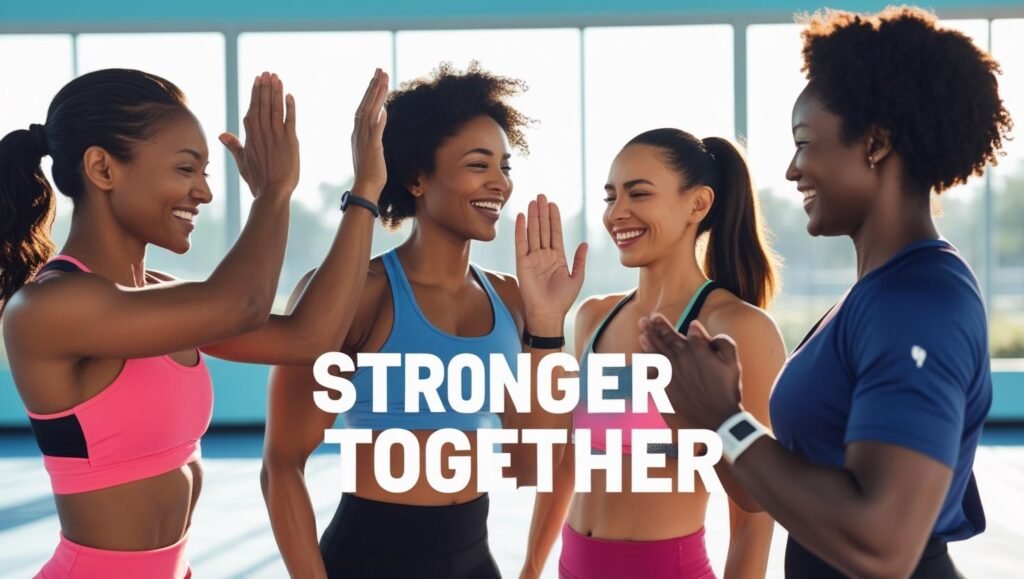
The Social Side of Sweat: The Role of Community in Fitness Challenges
Discover how shared goals and mutual support can transform your fitness journey from a solitary struggle into a collective victory.
The journey is better when we travel together: community fitness challenges create lasting bonds and results
In the world of fitness, we often focus on personal goals, individual achievements, and solo progress. But what if the secret to sustainable fitness success isn’t found in isolation but in connection? The rising popularity of community-based fitness challenges reveals a powerful truth: we are stronger together than we are alone.
Key Takeaway:
Participants in community fitness challenges are 65% more likely to complete their programs and 42% more likely to maintain their results compared to those who exercise alone.
The Science Behind Social Fitness
The connection between social support and fitness success isn’t just anecdotal—it’s backed by science. Research consistently shows that exercising with others triggers the release of endorphins at higher rates than solo workouts. These “feel-good” hormones create positive associations with exercise, making you more likely to stick with your routine.
Additionally, group fitness activities tap into our natural social instincts. Humans are inherently social creatures, and we’re wired to perform better when others are watching or participating alongside us. This phenomenon, known as social facilitation, explains why you might push harder in a group class than during a solo gym session.
Before diving into a community challenge, it’s helpful to understand your starting point. Tools like the BMI calculator or body fat percentage calculator can provide baseline metrics to track your progress throughout the challenge.
78%
Higher adherence rate in group fitness programs
2.5×
More likely to maintain routine long-term
45%
Greater calorie burn in group settings
The Accountability Factor
One of the most powerful aspects of community fitness challenges is built-in accountability. When you commit to others, you’re less likely to skip workouts or abandon your goals. This external accountability creates a bridge until internal motivation becomes strong enough to sustain your habits.
As highlighted in our article on staying motivated on your fitness journey, having workout partners who expect your presence creates a powerful incentive to show up, even on days when motivation is low.
“I’d tried to lose weight on my own for years with limited success. Joining a 12-week fitness challenge with my coworkers changed everything. Knowing they were expecting me at our morning workouts got me out of bed even on days I wanted to hit snooze. We celebrated each other’s victories and problem-solved together through plateaus. I lost 18 pounds, but more importantly, I gained a support system that keeps me consistent.”
— Sarah T., 34, Community Challenge Participant
Types of Community Fitness Challenges
Community fitness challenges come in many forms, each offering unique benefits and social dynamics:
Step Challenges
Compete to reach daily or weekly step goals, perfect for beginners. Track progress with fitness wearables and apps that allow for team leaderboards.
Transformation Challenges
Focus on body composition changes over a set period (typically 6-12 weeks). Often include nutrition guidance and workout plans.
Discover if you can lose fat and build muscle simultaneously
Workout Consistency Challenges
Commit to a certain number of workouts per week or month. Simple to track and highly effective for building habits.
Nutrition-Based Challenges
Focus on dietary changes like increasing water intake, eating more vegetables, or following specific meal plans.
For those interested in nutrition-focused challenges, our macro calculator and calorie calculator can help you establish personalized targets that support your fitness goals.
Creating Your Own Community Challenge
Inspired to start your own fitness community? Here’s how to create an effective challenge that keeps participants engaged and motivated:
- Set clear, achievable goals: Define specific outcomes that are challenging yet attainable within the timeframe.
- Establish a timeline: 30-day challenges work well for habit formation, while 6-12 weeks is ideal for physical transformations.
- Create accountability mechanisms: Daily check-ins, progress photos, or workout tracking in a shared space.
- Build in celebration points: Recognize milestones and achievements throughout the challenge, not just at the end.
- Provide resources: Share workout plans, nutrition guides, and tools like our weight loss calculator to help participants succeed.
Community Challenge Tracker
Track your progress in your current community challenge:
Click to mark completed items. Data is stored locally on your device.
Overcoming Common Challenges
While community fitness challenges offer tremendous benefits, they’re not without potential pitfalls:
Comparison Trap
In group settings, it’s easy to fall into unhealthy comparison with others who may have different body types, fitness backgrounds, or natural abilities.
Solution: Focus on competing against your previous self, not others. Track personal improvement metrics rather than comparing absolute numbers.
Maintaining Momentum After the Challenge
Many participants experience a motivation drop once the structured challenge ends.
Solution: Plan a “maintenance phase” with the group that continues some aspects of accountability but with less intensity. Consider our guide on staying motivated on your fitness journey.
One-Size-Fits-All Approaches
Not all challenge parameters work equally well for every participant.
Solution: Allow for personalization within the framework. For example, participants can use our BMR and TDEE calculator to set individualized calorie targets while still participating in the group challenge.
Technology’s Role in Community Fitness
Digital platforms have revolutionized how we experience community fitness. Apps and online communities allow us to connect with like-minded individuals regardless of geographic location. This technological evolution has democratized access to fitness communities, making it possible to find your tribe even if local options are limited.
As explored in our article on the technological revolution in fitness, digital tools are making fitness more connected, accessible, and engaging than ever before.
Ready to Experience the Power of Community?
Join our next 30-day fitness challenge starting soon! Connect with like-minded individuals and transform your fitness journey from a solo struggle into a shared adventure.
Finding Your Fitness Community
Not sure where to start? Here are some ways to find or create your fitness community:
- Local fitness studios and gyms: Many offer team challenges or small group training.
- Workplace wellness programs: Check if your employer sponsors fitness initiatives.
- Online communities: Join Facebook groups, Reddit communities, or fitness apps with social features.
- Friend and family groups: Start small with people you already know and expand from there.
- Specialized communities: Find groups focused on specific activities like running, yoga, or strength training that align with your interests.
Remember that the best community for you is one that aligns with your values and goals. Whether you’re focused on strength training, HIIT workouts, or yoga for weight loss, there’s a community out there waiting for you.
Conclusion: The Multiplier Effect
The power of community in fitness isn’t just about accountability—it’s about the multiplier effect. When we share our journey with others, our individual efforts combine to create something greater than the sum of its parts. We learn from each other’s experiences, draw inspiration from others’ successes, and find comfort in knowing we’re not alone in our struggles.
As you consider your fitness goals, remember that incorporating a social element might be the missing ingredient that transforms temporary changes into lasting habits. Whether you join an existing challenge or create your own community, the connections you form may prove just as valuable as the physical results you achieve.
After all, fitness isn’t just about changing your body—it’s about changing your life. And life-changing journeys are always better when shared.
Remember:
The most successful fitness journeys combine personal commitment with community support. Find your tribe, and you’ll find your strength.
